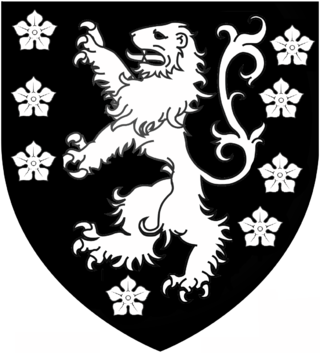Related Research Articles

This is a list of the High Sheriffs of the English county of Nottinghamshire.

The Manor of Clifton was a historic manor situated near the City of Nottingham, England. The manor house, known as Clifton Hall is situated on the right bank of the River Trent in the village of Clifton, Nottinghamshire,. about 3+1⁄2 miles south-west of the historic centre of the City of Nottingham, now partly the campus of Nottingham Trent University and partly a large council estate of modern housing.

Two unrelated baronetcies have been created in the surname of Clifton.

Sir Gervase Clifton, 1st Baronet, K.B. was an English politician who sat in the House of Commons at various times between 1614 and 1666. He supported the Royalist cause in the English Civil War. He was educated at St John's College, Cambridge.

Sir Nicholas Slanning, 1st Baronet FRS of Maristow in the parish of Tamerton Foliot, Devon, was an English courtier and politician who sat in the House of Commons between 1667 and 1689.

Sir John Newton, 2nd Baronet was an English politician who sat in the House of Commons from 1660 to 1685.

Sir William Hickman. 2nd Baronet was an English politician who sat in the House of Commons from 1660 to 1682.
Sir Henry Peckham (1614–1673) was an English landowner, lawyer, judge, administrator, and politician who sat in the House of Commons as MP for Chichester in Sussex at various times between 1654 and 1673.
Sir Robert Brooke was an English landowner, magistrate, commissioner, military officer, knight and MP who sat in the House of Commons from 1660 to 1669. Dying at the age of 32, his promise was cut short, and the core of his estates in East Suffolk passed by marriage into the Blois family.
Sir Thomas Ingram was an English politician who sat in the House of Commons in two periods between 1640 and 1672. He supported the Royalist cause in the English Civil War.
Sir Charles Hussey was an English politician who sat in the House of Commons in two periods between 1656 and 1664.
Clifton is a surname.

Christopher Clapham of Beamsley near Skipton in Yorkshire, England, was a politician who sat in the House of Commons in 1659 and 1660.
John Hele was an English lawyer and politician who sat in the House of Commons between 1659 and 1661.

Sir William Clifton, JP was 3rd Baronet Clifton of Clifton, Nottinghamshire, and Deputy Lieutenant of Nottinghamshire from 1683 to 1686. In 1685, he founded a regiment which later became the 15th Regiment of Foot and subsequently the East Yorkshire Regiment.
Sir Philip Howard was an English soldier and politician who sat in the House of Commons between 1659 and 1679.

Sir Edward WalpoleKB was an English politician and knight who sat in the House of Commons from 1660 to 1668.
John Thornhagh (1648–1723), of Fenton and Osberton, Nottinghamshire, was an English Whig politician who sat in the English and British House of Commons between 1689 and 1710.
Sir Edward Evelyn, 1st Baronet DL was an English Tory Member of Parliament who served in a number of local offices in Surrey and found favour under James II of England. Removed from several local offices at the close of the latter's reign, he was largely replaced in them by William III and Mary II and appointed a gentleman of the privy chamber. He died a few years later, dividing his property among the three daughters who survived him.
Anthony Eyre JP was an English politician who sat in the House of Commons from 1661 to 1671.
References
- 1 2 3 4 Edwards, E. R. "CLIFTON, Clifford (1626-70), of Clifton-on-Trent, Notts". www.historyofparliamentonline.org. History of Parliament Online . Retrieved 15 December 2022.
- ↑ "Library and Archive Catalogue". Royal Society. Retrieved 17 March 2012.[ permanent dead link ]
- 1 2 3 4 Manuscripts and Special Collections staff 2013.
- Sources
- Manuscripts and Special Collections staff (30 December 2013), "Biography of Sir Clifford Clifton (1626-1670)", Manuscripts and Special Collections, University of Nottingham, retrieved 30 December 2013